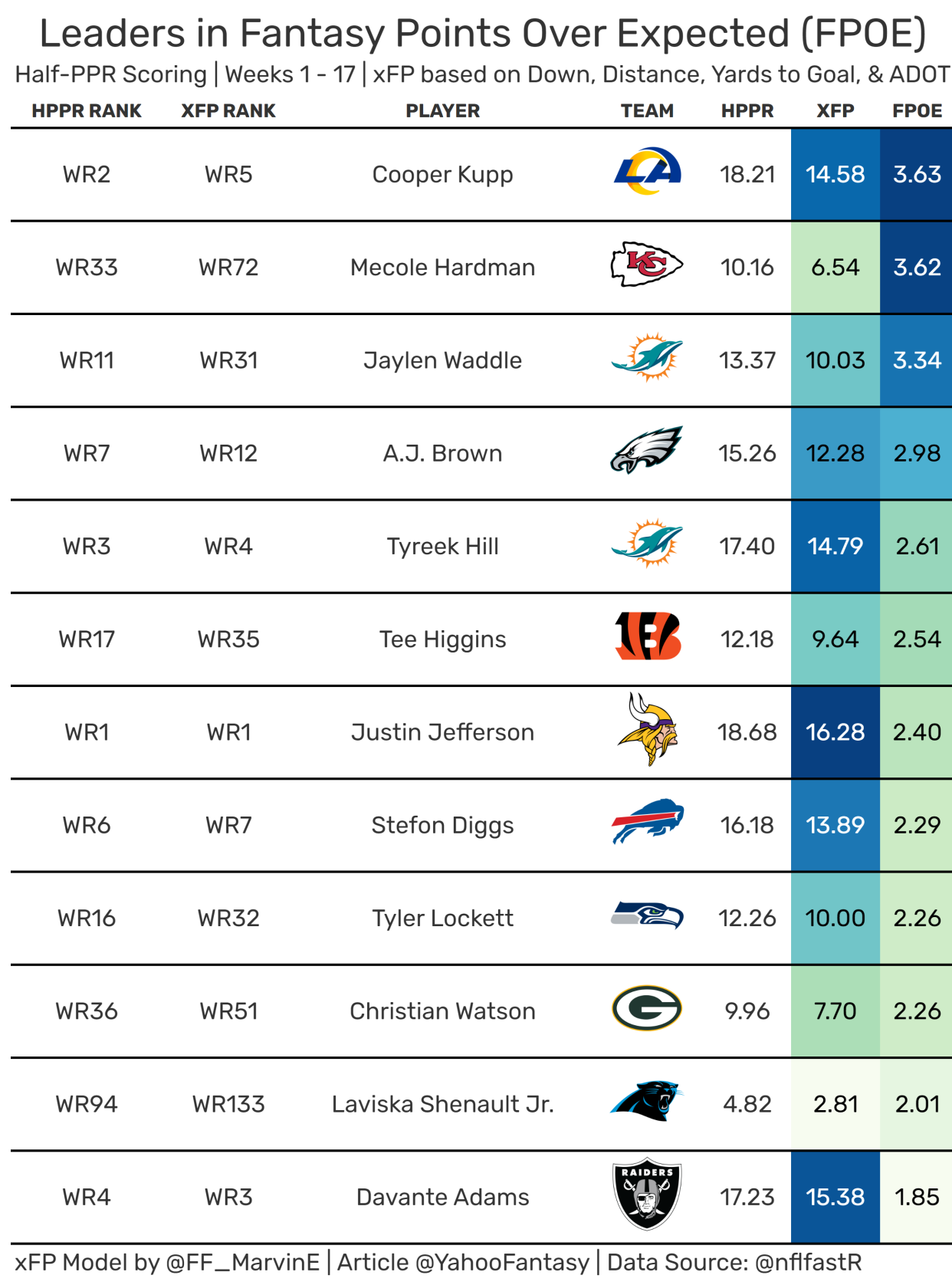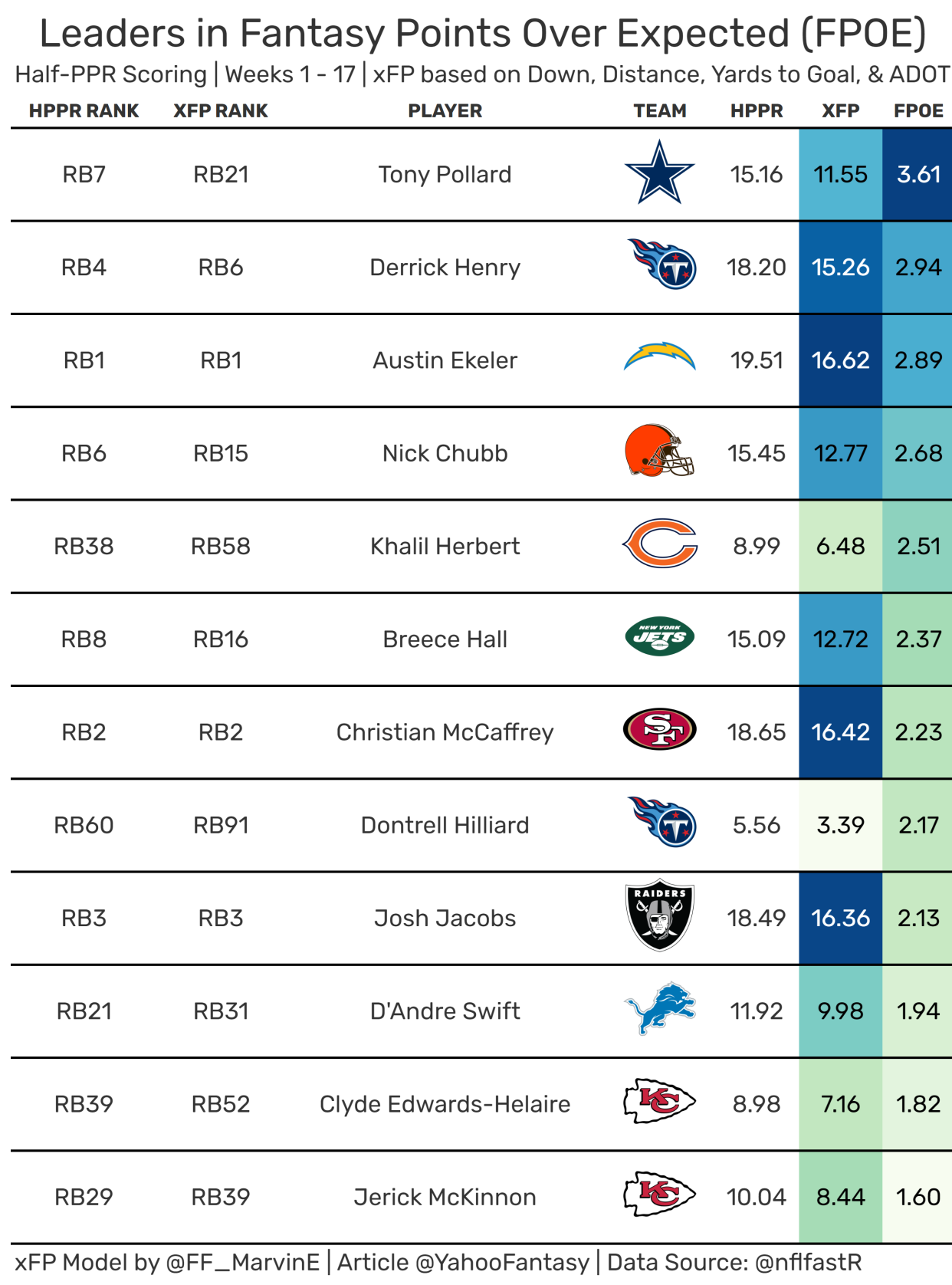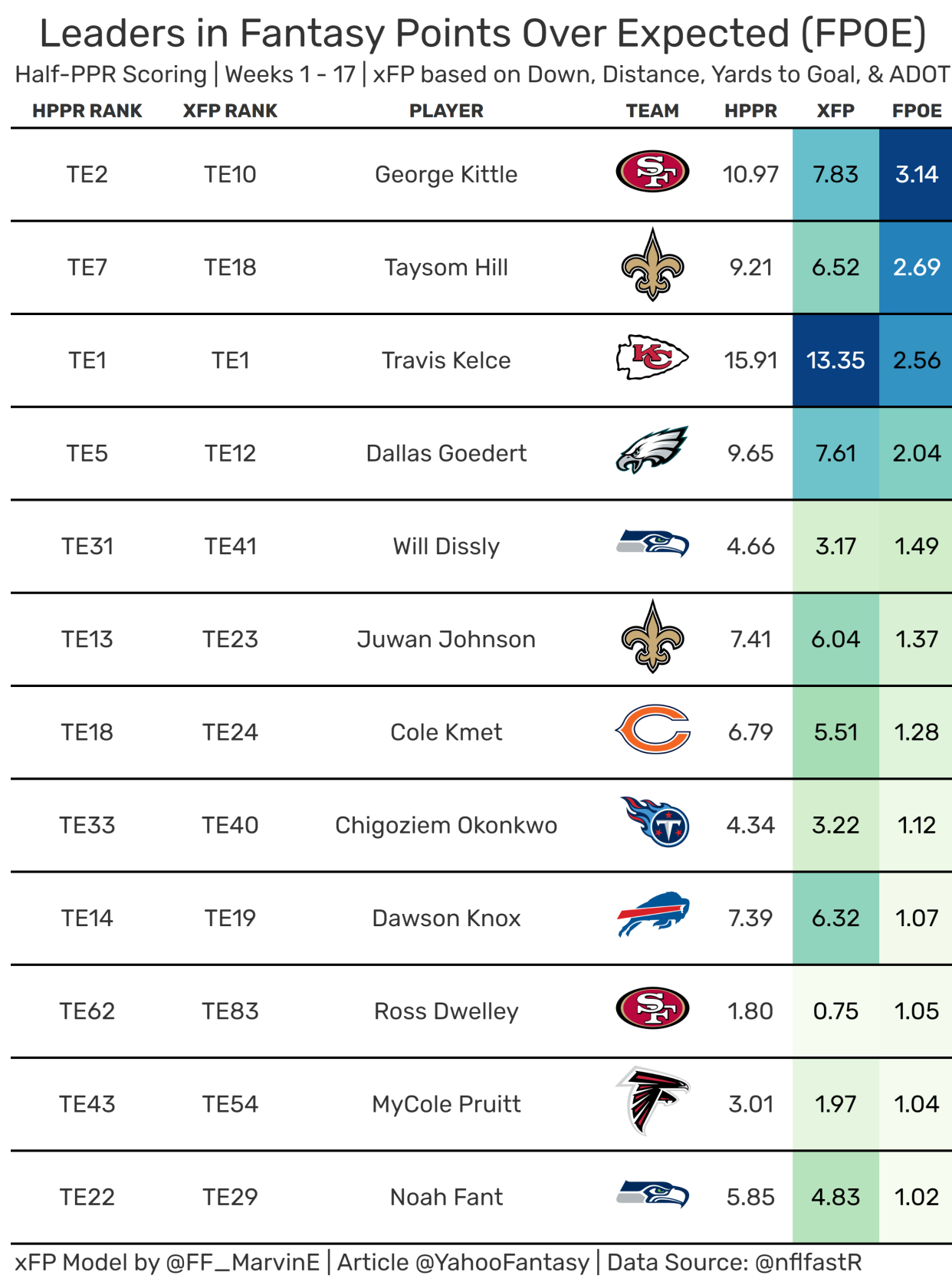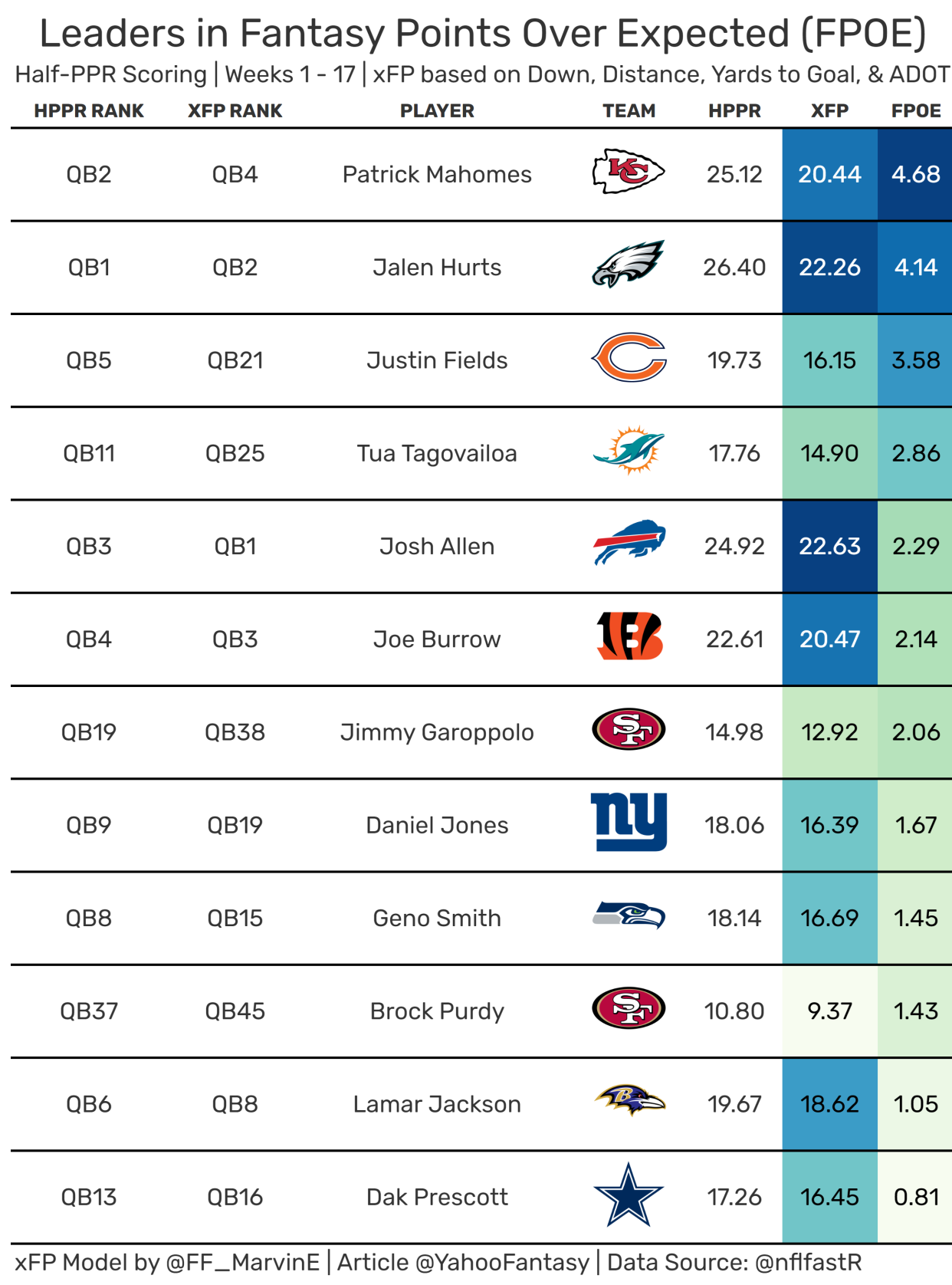Fantasy Football: Which players blew past all their expectations?
Welcome back, fantasy managers. In this piece, we will be focusing on the most efficient players this season. In other words, these players scored the most Fantasy Points above their Expected Fantasy Value.
If you are new to this series, you might be wondering what those metrics mean.
Expected Fantasy Points (or xFP): A usage metric that calculates the average fantasy value of a player’s total opportunities based on historical play-by-play data.
Fantasy Points Over Expected (or FPOE = Actual Points - Expected Points): An efficiency metric that is often subject to regression year over year. Players who rely on FPOE to produce are much more volatile on a weekly basis.
Keep in mind, the most efficient players are not always the most productive for fantasy managers, which is why we need to incorporate volume and usage (or xFP) into the evaluation. Lastly, all stats outlined below are “per game” unless stated otherwise.
For a more detailed breakdown of these metrics, be sure to check out my series primer from Week 1!
Let’s dive in!

A.J. Brown - Philadelphia Eagles
Despite having to acclimate to a brand new team and offensive scheme, A.J. Brown showed us once again why he is truly one of the most elite wide receivers in the league. As you can see above, he was one of the most efficient players in fantasy, scoring +2.98 points above his expected value. Beyond his efficiency, Brown’s value for fantasy managers lies in his incredible usage, leading the Eagles in multiple metrics:
Target Share (28.5 percent)
Air Yards Share (39.2%)
Expected Fantasy Points (12.3)
In other words, Brown was clearly the focal point for the Eagles’ passing attack. Even more impressive, he was able to produce such elite numbers despite the breakout of DeVonta Smith, who also finished as a top-24 wide receiver this season. Therefore, with this offense remaining mostly unchanged, I fully expect both Smith and Brown to continue to dominate for fantasy managers in 2023.
Jaylen Waddle - Miami Dolphins
Jaylen Waddle was one of the most efficient fantasy wide receivers this season, scoring +3.34 Fantasy Points Over Expected. On the other hand, his usage value only ranks WR31 at 10.03 Expected Fantasy Points.
What does this tell us about Waddle’s production?
While he has the upside to win you a matchup on any given week, he is much more volatile on a weekly basis. Fantasy managers may remember experiencing some of this volatility in recent matchups as he ranked outside of the top 60 in half-PPR leagues in Weeks 13 and 14, and then followed that up with two WR1 performances. This is partially due to Tyreek Hill’s presence, who — as you can see in his usage value above — commanded a significant amount of volume in the Dolphins' offense.
So does this mean you should avoid drafting Waddle in 2023? It truly depends on the draft cost. Because based on his usage this season, I would much rather rely on him as a WR2 in my fantasy lineup.

Austin Ekeler - Los Angeles Chargers
Austin Ekeler is the fantasy MVP for the 2022 season.
Not only did he finish as the RB1 in Fantasy Usage (16.6 xFP), but he was also one of the most efficient running backs this season with +2.9 FPOE. Because of his unique combination of high usage and efficiency, Ekeler was a consistent force for fantasy managers every week, finishing as an RB1 in all but five games this season. In fact, Ekeler and Christian McCaffrey are the only running backs with 10 or more RB1 performances this year. Therefore, fantasy managers should not overthink their drafts in 2023. Even though he is approaching his age-28 campaign, Ekeler should be a top-three pick in next year’s drafts as he continues to perform at a truly elite level.
Breece Hall - New York Jets
With all the noise surrounding the quarterback position for the Jets, it may be easy to forget they had a young running back in Breece Hall who was on the verge of an elite campaign before his season-ending injury. In fact, on a per-game basis, Hall was one of the most efficient running backs scoring +2.37 Fantasy Points Over Expected.
Keep in mind, the Jets started the year with Hall as their RB2 as he averaged only 36% of the offensive snaps behind Michael Carter in their first two games. Once they decided to hand him the keys in Week 3, Hall was one of the most productive running backs in the league. From Weeks 3-6 (prior to his injury), Hall was the:
RB5 in Expected Fantasy Points (16.7)
RB1 in Air Yards Share (11.7%)
RB9 in Opportunity Share (35.9%)
In short, do not forget about Hall who profiles as an RB1 next season, assuming he comes back fully healthy for 2023.

George Kittle - San Francisco 49ers
As you can see in the table above, if you only relied on the most efficient fantasy tight ends, you may be very disappointed as most of them do not command a significant amount of volume.
George Kittle, on the other hand, provides a healthy balance of both high usage and efficiency for fantasy managers. In fact, he is the TE1 in Fantasy Efficiency through Week 17, scoring an impressive +3.14 Points Over Expected. From a volume standpoint, while his usage was not quite as high as Mark Andrews or Travis Kelce, he still commanded a solid 18.4% target share and 17.9% air yards share this season. Because he was only the TE10 in fantasy usage, his weekly performance did provide some volatility — finishing outside of the top 20 in six games. However, fantasy managers should be able to live with those performances since Kittle’s upside and efficiency can win you a matchup on any given week.

*As mentioned above, these stats are on a per-game basis. As a result, Brock Purdy’s numbers are slightly skewed as he was active in three games in which he only played a handful of snaps.
Justin Fields - Chicago Bears
As I was analyzing the quarterback position, I was not surprised to find Justin Fields near the top in efficiency, scoring +3.6 Fantasy Points Over Expected per game. What did surprise me is he only ranked as the QB21 in fantasy usage at an Expected Fantasy Value of 16.2 xFP.
But when you dig a little deeper into his production, it becomes obvious that his lack of passing volume affected those numbers heavily — especially early on in the season. In fact, he did not exceed 30 pass attempts in any game this season. Naturally, when Fields is running the ball at a high rate, we can look past the low passing volume. After all, rushing attempts lead to more fantasy points. However, when he does NOT rush the ball more than 10 times, he has finished outside of QB1 range in six of eight games this season.
It is important to note that this was likely driven by personnel as the Bears’ wide receiver corps, especially after Darnell Mooney was placed on IR, was devoid of consistent playmakers. Assuming the Bears use their abundance of cap space and draft capital to add a few impactful receivers, I would not be surprised if Chicago employed a more pass-heavy scheme next season. If that were to happen, Fields would undoubtedly have the upside to finish as the QB1 for fantasy, especially with his tremendous rushing ability.

